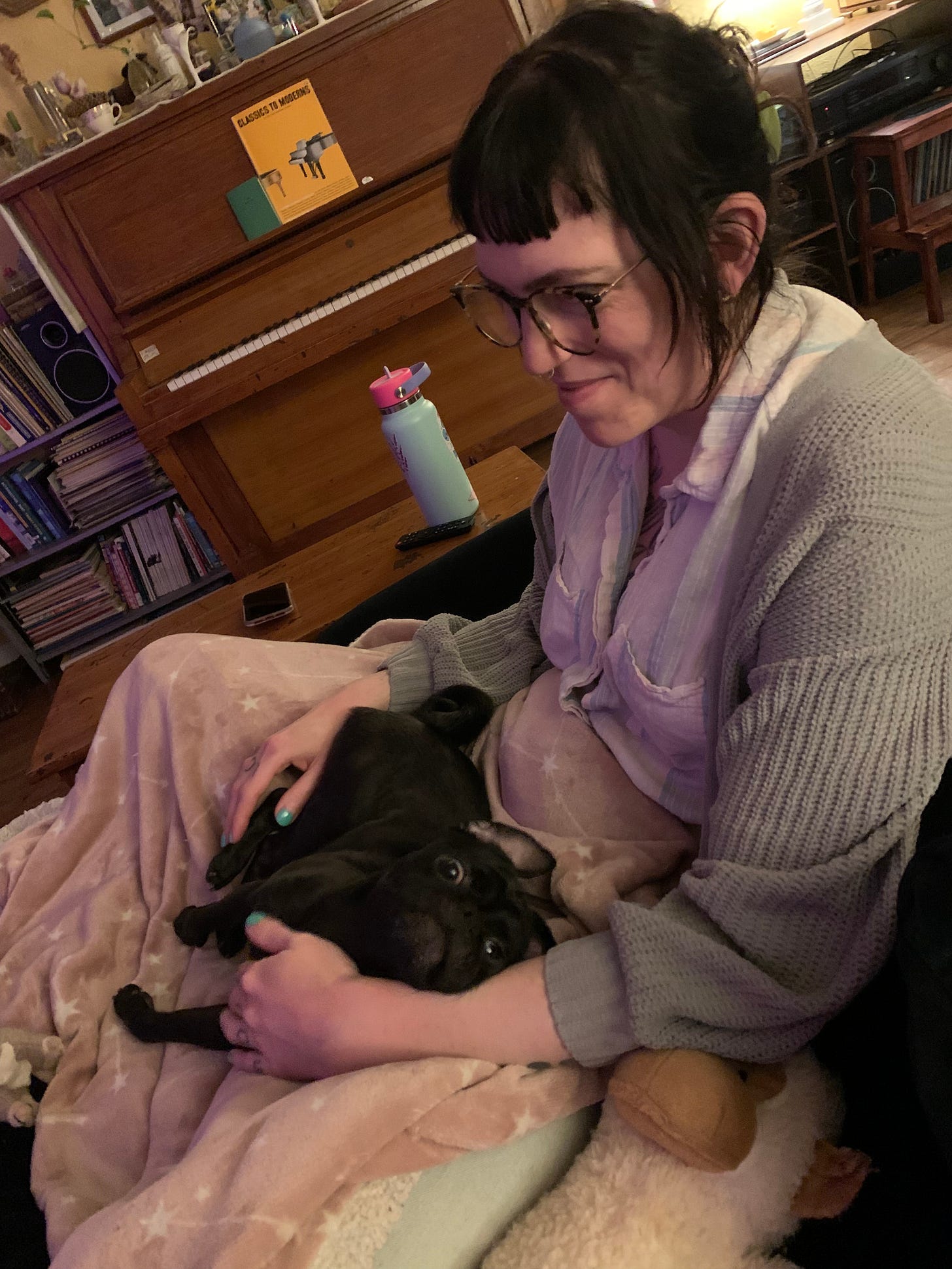I watched Anora on a flight. Tiny iPhone screen. Over-ear headphones. I know, I know. Not ideal. I’d heard a lot about the film, how so many people hated it (mostly my sex worker friends, but others, who’ve never done sex work, but were still bored by it all the same) and how so many others loved it (The Academy. Critics.). A coworker told me he thought the movie was beautiful and complicated. I found the movie a little slow (and so, boringly straight). Halfway through, I found myself thinking it was like a less interesting Uncut Gems, lots of running around NYC, people screaming in SUVs. Mostly, I found myself feeling meh (the worst response to art, in my opinion). That is until the end. Ani and Igor (the “fixer”) sit in Igor’s car outside Ani’s home. Igor passes Ani her engagement ring that had been taken from her earlier, a sign of goodwill. She thanks him. Climbs on top of him and starts unbuttoning his pants. Snow falls outside. They start to have sex. All is good, the sex goes as it has throughout the entire film until Igor tries to kiss her. Ani breaks down, swatting at his face and chest. She sobs. The credits roll with no soundtrack, only the sound of Anora’s weeping.
I’ve been thinking a lot about how to end stories. Maybe because I recently gave my short lecture on endings for my novel writing class. Maybe because I’ve been working on a novel for a few months and the ending recently came to me, something to write toward. Maybe because American Imperialism is coming to a close, and this country often feels like a bad dystopian novel, so on the nose. (May something more free and more just rise in its place.)

Whenever I discuss endings with my students, I always send out this post from Jami Attenberg’s newsletter. I think she nails how it feels to find the ending to a story, and also, how we can feel like we’ve found the ending and hold onto it for months, only for something else to present itself at the end. I especially like the part where she talks about an idea from Jeff VanderMeer, how endings can either support, defy, or disappoint the status quo. Also, that endings shape the story’s meaning but they are not the story’s meaning.
My endings often feel like an opening. I want my reader to think back on the beginning of the book and wonder how the fuck did we get here?!? I want the ending to feel inevitable but also be unpredictable. I’ve been thinking a lot these last few days as to why I found myself rolling my eyes HARD at Anora’s ending. The ending doesn’t seem to offer any insight into what had occurred over the past two weeks in the film. Sex worker marries rich oligarch. Rich oligarch abandons her because his parents’ demand he do so. She is offered kindness by unlikely ally, and her only response is to fuck him. Sex worker responds with sex. The ending feels like a tapering of Ani’s world, something that could be pulled off but doesn’t work in this context.
Here, it’s too boring and predictable.
Sometimes, reality is we don’t change. We experience trauma and hurt and then we fall back into our old selves. Only Ani seemed destined for something else. In the Nevada office where she signs the annulment papers, she tosses the sable fur coat, no longer wanting Vanya’s lavish gift. She is hurt, sure, but also cunning. For her (as with most sex workers), it is about the money. Here, in the office when she realizes Vanya never loved or respected her, she seems to return to the notion that her clients will not love her, but also that some gifts are not worth the disrespect. The breakdown in the car later seems like a regression. The ending supports the status quo, a shame since so much of the movie upends how mainstream Hollywood has depicted sex work in the past. The film seems to say, “See how broken this sex worker is? She’ll be this way forever.”
Endings need not be happy. How trite! How unrealistic! But I do want an ending to break my pattern recognition. Feel like witchcraft. If a character isn’t going to change, then that resistance to growth should feel like a knot tied so tight that to untie it seems impossible. An ending should be surprising in its action and emotionality. In fiction and in life, a good ending is difficult, but that doesn’t mean we shouldn’t try.
What I’ve been reading: A few months ago, I read Karen Russell’s newest The Antidote, an incredibly rich novel following a Prairie Witch during the Dust Bowl. Hands down, my favorite novel so far this year.
What I’ve been watching: I know it’s gotten quite a bit of love, but The Pitt on HBO, a realistic depiction of a single day in a Pittsburgh ER told in one hour installments.




I haven't seen "Anora" yet, like "Emilia Pérez", but seing the bad critics from real people and not from the oligarchies/System it doesn't surprise me at all that the movie is bad and doesn't reflect the true reality of s*x workers... It's a shame that this people try to shape our minds with their agenda...